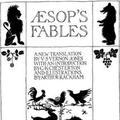THE OLD WOMAN AND THE DOCTOR
An Old Woman became almost totally blind from a disease of the eyes, and, after consulting a Doctor, made an agreement with him in the presence of witnesses that she should pay him a high fee if he cured her, while if he failed he was to receive nothing.
أصيبت امرأة عجوز بالعمى التام تقريبًا بسبب مرض في عينيها، وبعد استشارة طبيب، اتفقت معه في حضور شهود على أنها ستدفع له مبلغًا كبيرًا إذا شفاها، بينما إذا فشل فلن يتلقى شيئًا.
Yaşlı bir kadın, bir göz hastalığından neredeyse tamamen kör oldu ve bir Doktora danıştıktan sonra, tanıkların huzurunda, eğer onu tedavi ederse ona yüksek bir ücret ödemesi gerektiğine dair bir anlaşma yaptı; başarısız olursa, kendisi hiçbir şey almamak.
The Doctor accordingly prescribed a course of treatment, and every time he paid her a visit he took away with him some article out of the house, until at last, when he visited her for the last time, and the cure was complete, there was nothing left.
وبناءً على ذلك، وصف الطبيب مسارًا للعلاج، وفي كل مرة كان يزورها كان يأخذ معه بعض الأشياء من المنزل، حتى عندما زارها أخيرًا للمرة الأخيرة، وكان العلاج كاملاً، لم يتبق شيء منها.
Lekarz odpowiednio zalecił kurację i za każdym razem, gdy składał jej wizytę, zabierał ze sobą jakiś przedmiot z domu, aż w końcu, kiedy odwiedził ją po raz ostatni i wyleczenie było kompletne, było nic nie zostało.
Doktor buna göre bir tedavi yöntemi önerdi ve onu her ziyaretinde yanında evden bir parça eşya aldı, ta ki en sonunda onu son kez ziyaret edene ve tedavi tamamlanana kadar. hiçbir şey kalmadı.
When the Old Woman saw that the house was empty she refused to pay him his fee; and, after repeated refusals on her part, he sued her before the magistrates for payment of her debt.
وعندما رأت المرأة العجوز أن البيت فارغ، رفضت أن تدفع له أتعابه؛ وبعد رفضها المتكرر، رفع دعوى قضائية ضدها أمام القضاة لسداد دينها.
Kiedy Stara Kobieta zobaczyła, że dom jest pusty, odmówiła zapłacenia mu honorarium; i po wielokrotnych odmowach z jej strony, pozwał ją przed sędziami pokoju o spłatę jej długu.
Yaşlı Kadın evin boş olduğunu görünce ona ücretini ödemeyi reddetti; ve kadın tarafından defalarca reddedildikten sonra, borcunu ödemesi için sulh hakimleri önünde dava açtı.
On being brought into court she was ready with her defence.
وعند إحضارها إلى المحكمة كانت مستعدة للدفاع عن نفسها.
Po postawieniu przed sądem była gotowa do obrony.
Mahkemeye çıkarıldığında savunmasıyla hazırdı.
"The claimant," said she, "has stated the facts about our agreement correctly.
"قالت إن المدعي ذكر الحقائق حول اتفاقيتنا بشكل صحيح.
– Powód – powiedziała – poprawnie przedstawiła fakty dotyczące naszej umowy.
"Davacı," dedi, "anlaşmamızla ilgili gerçekleri doğru bir şekilde ifade etti.
I undertook to pay him a fee if he cured me, and he, on his part, promised to charge nothing if he failed.
لقد تعهدت بدفع أجر له إذا نجح في علاجي، ومن جانبه وعدني ألا يتقاضى أي أجر إذا فشل.
Zobowiązałem się zapłacić mu opłatę, jeśli mnie wyleczy, a on ze swojej strony obiecał, że nic nie pobierze, jeśli mu się nie powiedzie.
Beni iyileştirirse ona bir ücret ödemeyi taahhüt ettim ve o da başarısız olursa hiçbir ücret almayacağına söz verdi.
Now, he says I am cured; but I say that I am blinder than ever, and I can prove what I say.
الآن يقول أنني شفيت، ولكنني أقول إنني أصبحت أعمى أكثر من أي وقت مضى، وأستطيع أن أثبت ما أقول.
Şimdi iyileştim diyor; ama her zamankinden daha kör olduğumu söylüyorum ve söylediklerimi kanıtlayabilirim.
When my eyes were bad I could at any rate see well enough to be aware that my house contained a certain amount of furniture and other things; but now, when according to him I am cured, I am entirely unable to see anything there at all.
عندما كانت عيني سيئة، كنت أستطيع على الأقل أن أرى جيدًا بما يكفي لأدرك أن منزلي يحتوي على كمية معينة من الأثاث وأشياء أخرى؛ لكن الآن، بعد أن شُفيت، وفقًا له، لم أعد قادرًا على رؤية أي شيء هناك على الإطلاق.
Kiedy moje oczy były złe, mogłem w każdym razie widzieć wystarczająco dobrze, by wiedzieć, że mój dom zawiera pewną ilość mebli i innych rzeczy; ale teraz, kiedy według niego jestem uzdrowiony, zupełnie nie mogę tam niczego zobaczyć.
Gözlerim bozukken, evimde belli bir miktar mobilya ve başka şeyler olduğunu anlayacak kadar iyi görebiliyordum; ama şimdi, ona göre iyileştiğimde, orada hiçbir şey göremiyorum.

